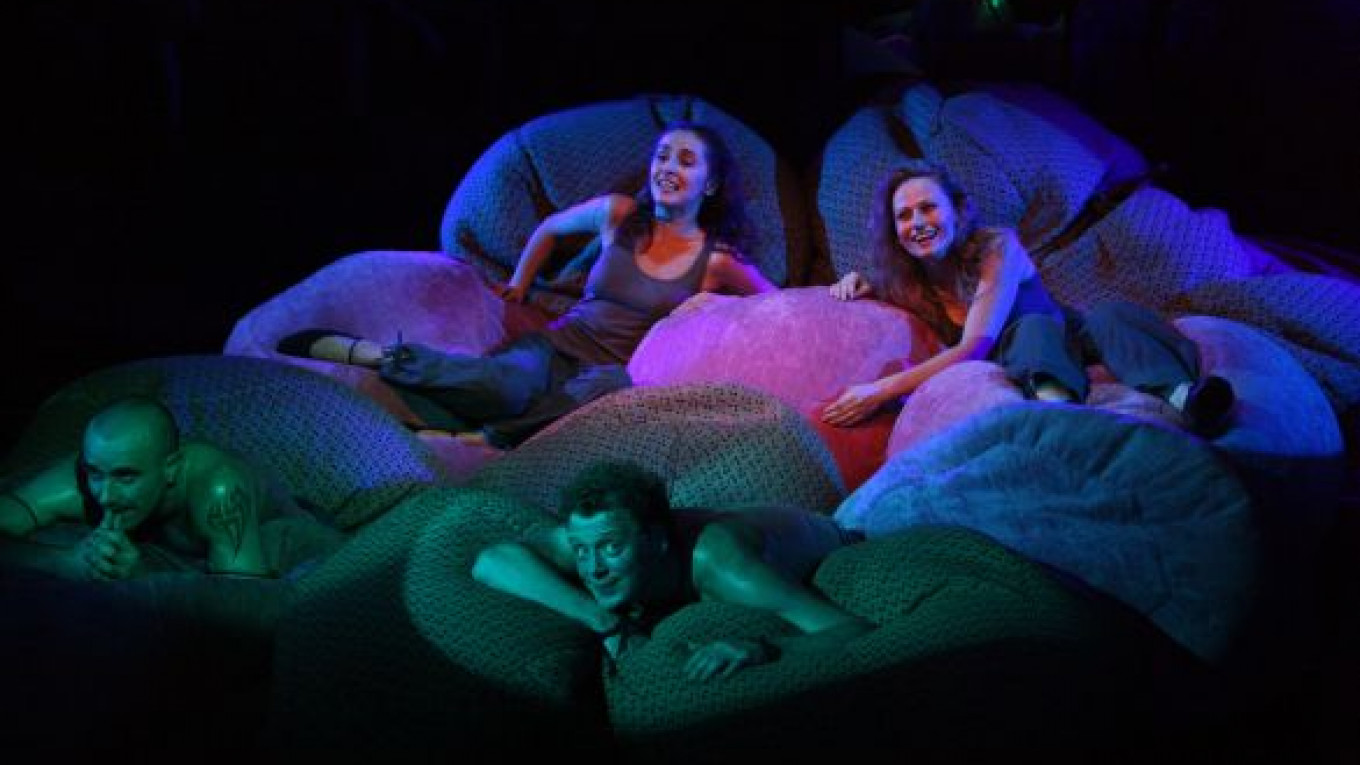A dark stage. A few puffs of stage smoke. A catchy rhythm and a dozen or so weird-looking objects — are these insect larvae, eggs, somebody’s butts or beanbag chairs? — begin to wiggle to the beat of the music.
It’s funny and disconcerting all in one.
In fact, these things are everything they appear to be: larvae, butts and beanbag chairs. It just depends on your point of view at any given moment.
Valery Belyakovich, who directed and designed Pyotr Gladilin’s play “Cameras” at the Theater na Yugo-Zapade, knows that these things are beanbag chairs. He staked his entire production on them. They are the “trick” that gives this show its aesthetics, its personality and its flexibility.
These, however, are anything but just beanbags once out on the theater’s stage. Yes, they are butts, larvae and eggs, but, as they hang off actors’ heads and shoulders, they are also the wings and torsos of insects and, when stacked in piles, they represent pillows and beds, and even the wall of Madonna’s apartment building in New York City.
They also function as the cameras that the two unusual main protagonists use to go around making pictures of people and things. Toporkov (Alexei Matoshin) and Govorkova (Oleg Leushin) haul off and whack others in the head with them, leaving imprints of their faces. Voila, a “portrait!”
Belyakovich has a fine-tuned sense of visual discipline that he applies to all his productions at the Theater na Yugo-Zapade. His shows often employ no props at all — just highly controlled movement about the mirrored stage of his playhouse.
In “Cameras” he uses just the one single design element. It provides a striking sense of aesthetic unity, even as it amazes for the ever-new functions it fulfills throughout the performance.
Yes, it also grows a tad monotonous, although that is a minor quibble. Overall, Belyakovich’s penchant for rigor and unity serves Gladilin’s play well. His story is an odd one that I can imagine would be difficult to stage.
In it, two embryos get together and decide to take a walk in the big, wide world after just five weeks of gestation in their mothers’ wombs. They meet some fascinating insects in the Russian countryside, then, after immigrating to the United States, meet some crazy folks in New York, where they go to make a career as photographers.
For the record, that’s how they wind up outside Madonna’s apartment. They were sent there by their editor at a New York newspaper to get a picture of Marilyn Manson leaving Madonna’s place at 3 a.m.
There is no need to seek logical sense of this. It is art, and art obeys its own rules. As told by Gladilin and Belyakovich, this allegory about the precious and fragile quality of life makes remarkable sense.
A cantankerous butterfly (Andrei Sannikov), which lives but a day on earth, teaches Toporkov and Govorkova some lessons about seeing beauty when it presents itself. A lowly fly (Denis Shalayev) shares its insights and wisdom.
On the other hand, the embryo photographers teach a jaded New York editor (Konstantin Kurochkin) a thing or two when they get him to hear the music of raindrops falling on a window sill.
The crux of the story, however, hangs on the attitudes of the two embryos’ mothers.
Govorkova’s mother Masha (Yelena Shestovskaya) is thrilled to be pregnant and looks forward to motherhood. Toporkov’s mother Tonya (Lyubov Yarlykova) is wracked by doubts. She fears that her husband doesn’t love her, that she isn’t ready to be a mother, and increasingly considers an abortion.
Toporkov, the tougher and more adventurous of the two pre-humans, finds that his place in the universe is jeopardized even before it begins. Perhaps that is why he is so passionate about seeing the world and recording it for posterity in photos — because it all may be taken away from him before his life has a chance to happen.
“Cameras” soft-pedals the moral aspect of its tale. It certainly is a work with an anti-abortion message, although it never engages in finger-pointing.
More to the point is that it provides a heightened atmosphere in which to ponder the treasures and tragedies that life has to offer.
I thought the second half of the play lagged some, primarily because the uniform quality of the show’s visual aspect began to wear thin. But “Cameras” is an intriguing and effective production that tackles its topic in an inventive way.
“Cameras” (Fotoapparaty) plays Nov. 26 at 7 p.m. at the Theater na Yugo-Zapade, 125 Prospekt Vernadskogo. Metro. Yugo-Zapadnaya. Tel. 433-1191, www.teatr-uz.ru. Running time: 2 hours, 50 minutes.
A Message from The Moscow Times:
Dear readers,
We are facing unprecedented challenges. Russia's Prosecutor General's Office has designated The Moscow Times as an "undesirable" organization, criminalizing our work and putting our staff at risk of prosecution. This follows our earlier unjust labeling as a "foreign agent."
These actions are direct attempts to silence independent journalism in Russia. The authorities claim our work "discredits the decisions of the Russian leadership." We see things differently: we strive to provide accurate, unbiased reporting on Russia.
We, the journalists of The Moscow Times, refuse to be silenced. But to continue our work, we need your help.
Your support, no matter how small, makes a world of difference. If you can, please support us monthly starting from just $2. It's quick to set up, and every contribution makes a significant impact.
By supporting The Moscow Times, you're defending open, independent journalism in the face of repression. Thank you for standing with us.
Remind me later.







